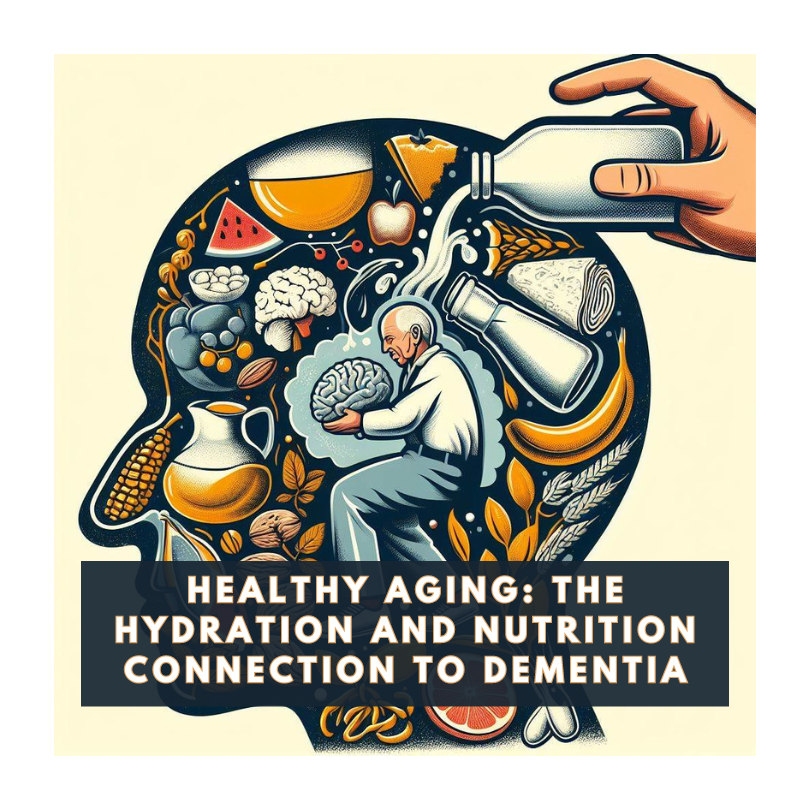Healthy Aging: The Hydration and Nutrition Connection to Dementia
The demographic landscape is undergoing a significant shift worldwide, with a growing proportion of individuals entering their golden years. According to the World Health Organization (WHO), the global population aged 60 and older is expected to reach 2 billion by 2050, doubling from the year 2015. With this demographic shift comes an increased prevalence of conditions like dementia, which poses a multifaceted challenge for individuals, families, and healthcare systems. One of the major challenges which come with the aging population and dementia is nutrition.

Healthy Aging: The Hydration and Nutrition Connection to Dementia
The demographic landscape is undergoing a significant shift worldwide, with a growing proportion of individuals entering their golden years. According to the World Health Organization (WHO), the global population aged 60 and older is expected to reach 2 billion by 2050, doubling from the year 2015. With this demographic shift comes an increased prevalence of conditions like dementia, which poses a multifaceted challenge for individuals, families, and healthcare systems. One of the major challenges which come with the aging population and dementia is nutrition.
Seniors often face unique nutritional challenges, such as decreased appetite, difficulty chewing or swallowing, and changes in taste and smell perception. These factors can contribute to inadequate nutrient intake, leading to deficiencies that may impact physical and cognitive health. As March is National Nutrition Month let us examine the intricate relationship between nutrition and dementia.
A Little Bit of History
In 1948 the Framingham Heart Study highlighted the connection between cardiovascular health and cognitive function. It set the stage for subsequent research into the impact of nutrition on cognitive health. In the late 20th century, the connection between omega-3 fatty acids and the structural integrity of the brain came to light. In the early 2000’s the Mediterranean diet gained attention for its potential protective effects against cognitive decline. In recent years the Gut Brain Axis research has proven yet again the connection between proper nutrition and cognitive health.
The Brain-Nutrition Nexus
As we eat and age, the brain undergoes a series of transformations that can impact cognitive function. Healthy nutritional choices can positively impact the body and brain. For example, eating foods high in fiber and low in sugar, reduce inflammation in the body and the brain. Drinking too much alcohol and caffeine has the opposite effect; both increase inflammation. Increased chronic inflammation has been linked to tissue damage, hardening of arteries, insulin resistance, and even cancer.
A diet lacking in quality nutrition leads to a diminished number of neurons, slower synaptic connections, and reduced blood flow to the brain. These changes can contribute to a decline in memory, processing speed, and overall cognitive abilities. The poorer the nutrition the more the body experiences shifts in metabolism, muscle mass, and bone density. For these reasons, focusing on the connection between our nutrition and aging process is important.
Water, Water, Everywhere
Water, often dubbed the elixir of life, plays a central role in the biological processes that govern our bodies. Its influence on healthy aging extends beyond mere hydration, reaching into cellular function, organ health, and disease prevention. A growing body of scientific evidence underscores the profound impact that adequate water intake can have on the aging process.
Dr. Sarah Mitchell, a renowned gerontologist, explains, "Our cells are like tiny machines that require water to operate efficiently. Dehydration can compromise these cellular processes, leading to premature aging and a decline in overall health."
When we drink enough water and all of our cells are hydrated, our joints feel better, our brain works better, and our skin looks better too. On the other hand, dehydration has been linked to impaired cognitive function including lack of focus and poor concentration, both of which affect cognitive function.
Nutrition in the Home or Community
Ensuring that your elderly loved one receives good nutrition is crucial for their overall health and well-being. Here are some tips different scenarios:
Living at Home
Regular Check-ins: Visit or call regularly to assess their well-being. Ask about their appetite, any changes in taste or dietary preferences.
Meal Planning: Plan balanced and nutritious meals in advance. Ensure a variety of food groups are included for a well-rounded diet.
Stock Healthy Options: Keep the pantry and refrigerator stocked with healthy, easy-to-prepare foods. Include fresh fruits, vegetables, lean proteins, and whole grains.
Meal Delivery Services: Consider using meal delivery services that provide nutritious meals to their doorstep.
Social Interaction: Encourage social activities, as loneliness or depression can impact their appetite.
Living in a Senior Living Community
Communication with Staff: Stay in regular communication with staff to discuss dietary needs and preferences.
Participation in Community Events: Encourage participation in community dining and events to foster socialization.
Feedback Channels: Establish open lines of communication to address any concerns or changes in their nutritional needs.
Family and Friend Visits: Coordinate family or friend visits for shared meals, creating a supportive environment.
Personalized Care Plans: Work with the community to create a personalized care plan that addresses their nutritional requirements.
If you have a loved one who does not seem to be thriving we can help. You can call our office at (239) 330-2133 or email us at info@scanyfl.com.





